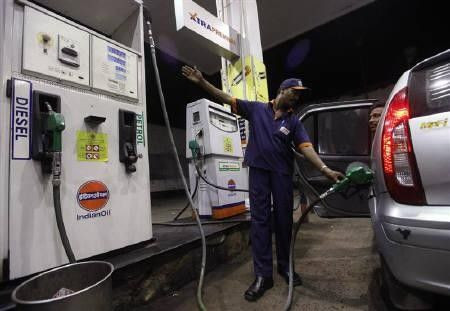Finance, Oil Ministries Push for Fuel Price Increase

The finance and oil ministries are lobbying for an increase in prices of diesel, kerosene and LPG, warning cabinet colleagues that time is running out to avert a fiscal disaster and a sovereign credit downgrade to junk by global ratings agencies.
"The situation is very, very serious," a finance ministry official involved in the fuel price discussions told Reuters.
"We may need up to 50,000 crore (500 billion Indian rupees or $8.99 billion) if there is no diesel price hike, leaving the fiscal deficit near 6 percent," he said. He declined to be identified due to the sensitivity of the issue.
The cabinet committee on political affairs, headed by Prime Minister Manmohan Singh, will make the final call on the hikes as early as next week after the oil ministry recommended the changes in a note this week, sources in the two ministries said.
The ministries have long advocated slashing subsidies on fuels like diesel that eat into the budget and affect the financial health of state-run oil companies. But fears of a popular backlash has stopped the government raising prices for more than a year.
The ministries are piling on the pressure now to try and squeeze the price rise through after the current parliament session ends on Friday and before a round of state elections begin at the end of the year.
"A sense of urgency is keenly felt by everybody right from the prime minister," a top oil ministry official told reporters.
Senior advisers to Finance Minister P. Chidambaram last week outlined the implications of raising diesel and other fuel prices for inflation and the fiscal deficit. The ministry is pushing for a rise of Rs 3-5 per litre in diesel prices and significant increases for LPG and kerosene.
"We have told him even a hike of one rupee per litre in diesel prices would bring down the finance ministry's oil subsidy burden by nearly 55 billion rupees besides helping the oil marketing companies to cut losses," said the finance ministry official.
The finance minister's immediate aim is to avert a downgrade that would make India the first country in the BRICS group - which also includes Brazil, Russia, China, and South Africa - to trade at junk, the official said. Ratings agencies Fitch and Standard & Poors warned earlier this year that a widening deficit had put India on the brink of losing investment grade.
Chidambaram also wants to convince the Reserve Bank of India (RBI) to lower interest rates. RBI Governor Duvvuri Subbarao also wants the government to rein in subsidies to check the ballooning deficit.
Another finance ministry official said an increase in the price of diesel, which accounts for more than 40 percent of all oil products consumption, would generate a short-term rise in inflation, but help bring down the fiscal deficit.
A fall in the fiscal deficit will boost private investment in the economy and ease inflation in the long term, he said.
The official said a slight cooling of headline inflation, which fell to a near three year low in July is also helping the case for tackling subsidies now.
LOSSES
The three state-run fuel retailers -- Indian Oil Corp, Bharat Petroleum Corp and Hindustan Petroleum Corp -- have together racked up losses of 405.4 billion rupees in their fiscal first quarter, four times the loss from a year earlier.
They say they incur revenue loss of 17.05 rupees and 32.70 rupees on sale of a litre of diesel and kerosene, and 347 rupees on the sale of a 14.2 kg cylinder of cooking gas or liquefied petroleum gas, adding up to $99 million a day of losses.
Even after a rise in diesel prices by 3-5 rupees per litre, the government would need 250-300 billion rupees to compensate oil firms at current global crude prices, said the second official in finance ministry.
Brent crude, which fell to nearly $94 a barrel in June end, has again climbed to over $113 a barrel.
The rupee, which has depreciated by nearly 9 percent since March, has further complicated matters, as oil firms had to spend more to buy crude despite the fall in crude prices.
"It is high time we should raise prices because our revenue losses have mounted," said BPCL Chairman R. K. Singh.
© Copyright Thomson Reuters 2024. All rights reserved.





















